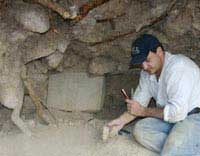Archaeologists in Italy are raising sheep to help protect the ruins at Pompeii from the growth of weeds.

Raising sheep is a way to protect the ruins at Pompeii. (Photo: REUTERS)
A flock of sheep in Italy is assisting archaeologists in preserving the ancient ruins of Pompeii – a Roman city that was buried during the eruption of Mount Vesuvius in 79 AD, according to CNN.
Archaeologists have only explored about two-thirds of the total area of 66 hectares of Pompeii, despite excavations having begun 250 years ago.
Preserving the unexplored areas of the ancient city against the ravages of nature and time is a top priority for those managing this archaeological site.
Mr. Gabriel Zuchtriegel, the director of the Pompeii Archaeological Park, stated: “If grass and other plants grow in or on the walls, the ancient houses here will be affected. We strive to use a sustainable approach to the entire environment, avoiding chemicals, avoiding planting, and preventing plants from growing on the walls and ruins.”
As a result, archaeologists have chosen sheep to help protect the area from the growth of weeds. A flock of 150 sheep has been brought to Regio V, the northern area of Pompeii that has not been fully excavated.
Mr. Zuchtriegel mentioned that the initiative to raise sheep does not contribute to reducing carbon emissions but helps save money and preserve the landscape.
“Raising sheep also helps to recreate the image of Pompeii at the time it was discovered. It was a forested area with vineyards and sheep. That was the kind of rural environment, and in the midst of that landscape, Pompeii emerged,” he described.





















































